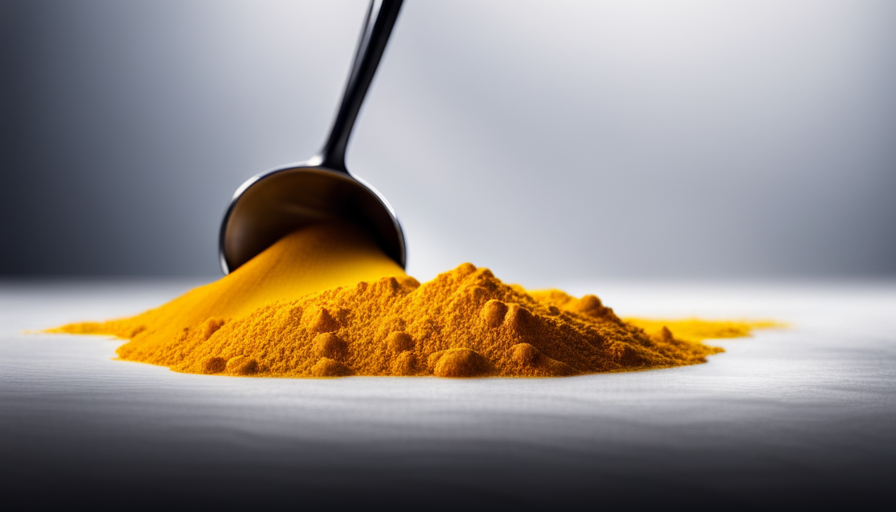Have you ever thought about why your poop might be yellow sometimes? One potential reason could be turmeric. Yes, that bright yellow spice commonly found in cooking and traditional medicine. But does turmeric actually cause your poop to turn yellow?
In this article, we will delve into the science behind turmeric’s color and its impact on digestion. We will also explore the various factors that can affect stool color, potential side effects of turmeric consumption, and the importance of hydration and diet in maintaining healthy digestion. Moreover, we will discuss when it might be necessary to seek medical attention if you notice abnormal changes in your stool color.
So, if you’re curious about the connection between turmeric and yellow poop, keep reading to find out more.
Key Takeaways
- Turmeric contains curcumin, which can cause yellow or orange-colored stool.
- Turmeric stimulates bile production, aiding in digestion and absorption of fats.
- Turmeric can stimulate bowel movements, preventing constipation.
- Yellow stool caused by turmeric consumption is temporary and harmless, but persistent yellow stools or concerning symptoms should be evaluated by a healthcare professional.
The Science Behind Turmeric’s Color
The science behind turmeric’s vibrant yellow color is fascinating and involves the presence of a compound called curcumin. Curcumin is a natural pigment that gives turmeric its distinct hue. It is known for its strong antioxidant and anti-inflammatory properties, which have been studied extensively for their potential health benefits.
When consumed, curcumin is not easily absorbed by the body, and instead passes through the digestive system largely unchanged. This is why turmeric can sometimes cause yellowish or orange-colored stool. However, it’s important to note that this is generally harmless and temporary.
Turmeric’s impact on digestion extends beyond its effect on stool color. It has been shown to promote healthy digestion by stimulating the production of bile, which aids in the breakdown of fats.
Impact of Turmeric on Digestion
When it comes to digestion, turmeric has some interesting effects. One of the key points to consider is its impact on bile production. Bile is essential for breaking down fats in the digestive system, and studies have shown that turmeric can increase bile production, aiding in fat digestion.
Additionally, turmeric has been found to stimulate bowel movements, which can help with regularity and preventing constipation.
Turmeric’s effect on bile production
If you consume turmeric regularly, you’ll be amazed at how it can effortlessly enhance bile production, resulting in a vibrant and cheerful yellow hue to your bowel movements. Bile, produced by the liver and stored in the gallbladder, plays a crucial role in the digestion and absorption of fats. Turmeric contains an active compound called curcumin, which has been shown to stimulate bile production and improve its flow. This increased bile production can aid in the breakdown and absorption of dietary fats, helping to prevent fat buildup in the liver. Additionally, turmeric’s effect on bile production can promote proper digestion and reduce symptoms of indigestion such as bloating and gas. As we explore turmeric’s role in stimulating bowel movements, we will gain a deeper understanding of its overall impact on digestive health.
Turmeric’s role in stimulating bowel movements
Get ready to experience the delightful effects of turmeric as it works its magic on your digestive system, stimulating healthy bowel movements and promoting optimal digestion. Turmeric has been shown to have several properties that contribute to its role in stimulating bowel movements:
- Anti-inflammatory effects: Turmeric contains a compound called curcumin, which has strong anti-inflammatory properties. Inflammation in the digestive tract can slow down bowel movements. By reducing inflammation, turmeric helps to improve the speed and efficiency of the digestive process.
- Muscle contractions: Turmeric has been found to stimulate the smooth muscle contractions in the intestines, known as peristalsis. These contractions help to propel waste through the digestive system, preventing constipation and promoting regular bowel movements.
- Bile production: As discussed in the previous subtopic, turmeric can increase the production of bile. Bile plays a crucial role in the digestion and absorption of fats. By improving bile production, turmeric ensures that the digestive system functions optimally.
Now that we understand how turmeric stimulates healthy bowel movements, let’s explore the factors that can affect the color of your stool.
Factors Affecting Stool Color
One intriguing factor that can influence the color of your stool is the consumption of turmeric, which may result in a vibrant yellow hue. Turmeric contains a compound called curcumin, which is responsible for its yellow color. When curcumin is ingested, it’s broken down by the digestive system and can give your stool a yellow tint.
However, it’s important to note that turmeric is not the only factor that can affect stool color. Other factors, such as the presence of bile pigments and certain medications, can also contribute to changes in stool color. It’s always advisable to consult a healthcare professional if you notice any significant changes in your stool color.
Moving forward, let’s explore the potential side effects of turmeric.
Potential Side Effects of Turmeric
When it comes to the potential side effects of turmeric, two key points to consider are gastrointestinal symptoms and allergic reactions or sensitivities. Some people may experience gastrointestinal symptoms such as diarrhea, nausea, or stomach upset after consuming turmeric.
Additionally, it’s possible for some individuals to have allergic reactions or sensitivities to turmeric, which can manifest as skin rashes, itching, or swelling.
It’s important to be aware of these potential side effects and consult with a healthcare professional if any concerns arise.
Gastrointestinal symptoms
Turmeric is truly a magical spice, turning your poop into a vibrant shade of yellow, making every trip to the bathroom a colorful adventure. But besides its colorful effect on your stool, turmeric can also cause gastrointestinal symptoms in some individuals. These symptoms may include nausea, bloating, and diarrhea. It is important to note that these side effects are generally mild and temporary, and they usually subside on their own. However, if you experience persistent or severe gastrointestinal symptoms after consuming turmeric, it is advisable to consult a healthcare professional. In the next section, we will explore allergic reactions or sensitivities that some people may have to turmeric, which can cause additional health concerns.
Allergic reactions or sensitivities
After discussing gastrointestinal symptoms associated with turmeric, let’s now explore the potential allergic reactions or sensitivities that some individuals may experience.
While turmeric is generally considered safe, it can cause allergic reactions in certain individuals. These reactions can range from mild symptoms like itching or hives to more severe ones like difficulty breathing or swelling of the face, tongue, or throat.
To better understand this topic, here are three important points to consider:
- Allergic Reactions: Some people may have an allergic reaction to turmeric, particularly if they’re allergic to other plants in the ginger family.
- Sensitivities: Turmeric may also cause sensitivities in certain individuals, leading to symptoms like stomach upset, nausea, or diarrhea.
- Cross-reactivity: Cross-reactivity between turmeric and other spices like ginger or cardamom is possible, so those with known allergies to these spices should exercise caution.
Now, let’s delve into the importance of hydration and diet to maintain a healthy digestive system.
Importance of Hydration and Diet
Staying properly hydrated and maintaining a balanced diet are key factors that can enhance the overall effectiveness of turmeric’s impact on your digestive system. Hydration is crucial as it helps to keep your stool soft and easy to pass, preventing constipation. Drinking an adequate amount of water throughout the day can promote proper digestion and ensure that turmeric is properly absorbed and utilized by your body.
Additionally, a balanced diet rich in fiber, fruits, and vegetables can support healthy bowel movements and optimize the benefits of turmeric. Remember to incorporate foods that are high in water content, such as cucumbers and watermelon, to stay hydrated. By prioritizing hydration and a nutritious diet, you can maximize the positive effects of turmeric on your digestive health.
As we move on to discussing when to seek medical attention, it’s important to understand the potential risks associated with turmeric consumption.
When to Seek Medical Attention
If you’re experiencing digestive distress that’s turning you into a human balloon, it might be time to consider seeking medical attention. While occasional changes in bowel movements are normal, persistent and severe symptoms like severe abdominal pain, blood in stool, or unexplained weight loss should not be ignored. These symptoms could indicate a more serious underlying condition that requires medical evaluation.
Additionally, if you have a history of gastrointestinal disorders, such as Crohn’s disease or ulcerative colitis, it’s important to be vigilant and seek medical attention if your symptoms worsen or become unmanageable. Remember, your health and well-being should always be a priority, so don’t hesitate to consult with a healthcare professional if you have concerns about your digestive health.
Moving forward to the conclusion and final thoughts, it’s important to understand the potential impact of turmeric on your digestive system.
Conclusion and Final Thoughts
In conclusion, it’s crucial to prioritize your digestive health and seek medical attention if you experience persistent and severe symptoms like unexplained weight loss or severe abdominal pain. Your digestive system plays a vital role in your overall well-being, and any significant changes in your stool color or consistency should not be ignored. While turmeric can cause your poop to turn yellow, it is usually harmless and temporary. However, if you notice persistent yellow stools or other concerning symptoms, it’s important to consult a healthcare professional to rule out any underlying conditions. To help you understand the possible causes of yellow stool, here is a table summarizing some common factors:
| Possible Causes of Yellow Stool |
|---|
| Diet high in turmeric |
| Infection or inflammation |
| Gallbladder or liver issues |
| Medications or supplements |
Remember, it’s always best to consult with a healthcare professional for an accurate diagnosis and appropriate treatment.
Frequently Asked Questions
Can turmeric cause other changes in stool color besides yellow?
Yes, turmeric can cause other changes in stool color besides yellow. It can turn stool shades of orange, brown, or even green. These changes are usually harmless and temporary.
Is it normal for turmeric to make your urine yellow as well?
Yes, it is normal for turmeric to make your urine yellow. The compound in turmeric called curcumin is responsible for this color change, which is harmless and usually temporary.
Are there any other foods or supplements that can cause yellow stool?
Yes, there are other foods and supplements that can cause yellow stool. Examples include foods high in beta-carotene like carrots and sweet potatoes, as well as certain medications and supplements containing iron.
How long does it usually take for turmeric to start affecting stool color?
Turmeric’s effects on stool color can vary. It typically takes a few days of regular consumption for any noticeable changes. However, individual responses may differ, so it’s best to consult a healthcare professional for personalized advice.
Does the amount of turmeric consumed affect the intensity of the yellow color in stool?
Yes, the amount of turmeric consumed can affect the intensity of the yellow color in stool. Higher amounts of turmeric may lead to a more vibrant yellow color in the stool.
Conclusion
In conclusion, after diving into the science behind turmeric’s color and its impact on digestion, it’s clear that this golden spice can indeed make your poop yellow. However, it’s important to note that this is usually harmless and temporary. Factors such as diet, hydration, and even certain medications can also affect stool color.
While turmeric has many potential health benefits, it’s always wise to listen to your body and seek medical attention if you have any concerns. Stay curious and keep exploring the fascinating world of natural remedies!










